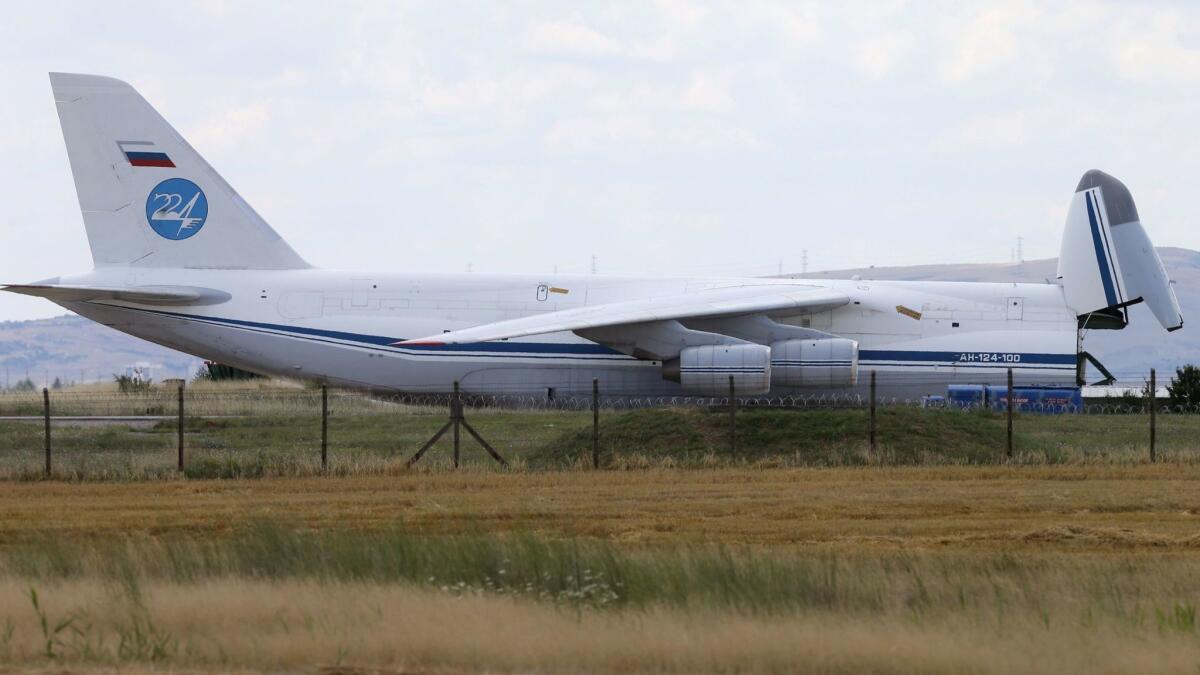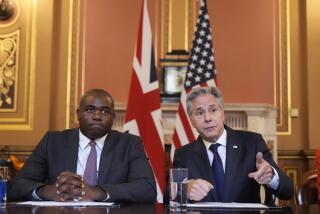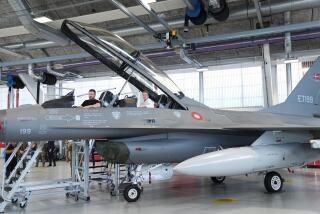Turkey receives missiles from Russia, rebukes from Congress

- Share via
Reporting from Istanbul, Turkey — Harsh words over the delivery to Turkey of a sophisticated Russian anti-aircraft system poured in Saturday, even as Moscow continued to deliver parts to an air base just outside the capital, Ankara.
The shipments to the Murted air base began Friday, despite the threat of sanctions from Washington and alarms the move could threaten Turkey’s long-standing membership in the NATO alliance.
“That a NATO ally would choose to side with Russia and Vladimir Putin over the alliance and closer cooperation with the United States is hard to fathom,” read a bipartisan statement issued by Eliot L. Engel, chairman of the House Committee on Foreign Affairs and ranking Republican member Michael McCaul.
The statement echoed similar calls from fellow Congress members for President Trump, who recently expressed sympathy for Turkey’s decision to strike a deal with Russia, to sanction officials in Ankara. “Turkey and [President Recep Tayyip] Erdogan must face stiff consequences for this decision,” the statement read.
While the decision to purchase the missile system could mark the beginning of the end of nearly 70 years of military cooperation between Ankara and Washington, for many in Turkey it was viewed as a vital national security step.
The deal comes as part of a wider understanding between Russia and Turkey on Syria, a geopolitical quagmire that has become a wedge between Ankara and Washington.
Moscow, a longtime ally of Syria, has backed Syrian President Bashar Assad in a devastating civil war against rebels supported by Turkey. But the two countries have engineered cease-fire agreements in Syria’s north, and, despite renewed fighting, continue to cooperate.
The U.S., meanwhile, has committed air power and thousands of troops to Syrian Kurdish factions Turkey considers terrorists, despite Ankara’s frequent protests.
The missile purchase was “not a choice but a necessity,” Turkish Defense Minister Hulusi Akar told acting Secretary of Defense Mark Esper by phone on Friday.
Air threats, including missiles potentially launched from within Syria, have been a “serious threat” to Turkey, said Akar, the former head of the Turkish armed forces.
The site of the S-400 deliveries, and the timing, appeared highly symbolic.
The Murted base was ground zero for a failed July 15, 2016, coup attempt against Erdogan. That night, the head of Turkey’s air force issued orders for F-16s based there to take off and target a list of government facilities, including the parliament and presidential palace in Ankara. Akar, then head of the armed forces, was held hostage at the same base. Erdogan was vacationing at the Aegean Sea resort of Marmaris, and two F-16s were dispatched to shoot down his plane. In all, 250 civilians died that night, but the coup was thwarted.
Ergodan’s ongoing concern that rogue fighter jets could return to the skies to hunt him or other Turkish leaders in the future helped drive the anti-aircraft deal, said Aaron Stein, director of the Middle East program at the Foreign Policy Research Institute.
“When you nearly die, your outlook on life changes, and I don’t think Erdogan is unique in that,” he said. “It’s a miracle he made it out that night alive considering the state of affairs before midnight, so I think he is acutely aware of air defense in ways he was not before July 15, 2016.”
In addition to the need to take out rogue aircraft, the S-400s could help fill an air defense gap for Turkey. More than 300 F-16 pilots were purged immediately after the coup attempt — part of a larger purge of tens of thousands of military personnel suspected of ties to the coup attempt — leaving Turkey with a shortage of fighter pilots. Turkey paid Russia about $2.5 billion for the system, and about 80 Turkish military personal are expected to be trained in Moscow in how to operate it in the coming months.
Yet as a result, Turkey risks losing its stake in NATO’s next premier fighter jet program. Turkish officials say they have already invested about $1.2 billion in helping develop the aircraft, which includes parts that are currently only manufactured by Turkish firms, but the Pentagon, citing the S-400 purchase, has halted training of Turkish pilots for the stealth jet and suspended delivery of the first batch this year.
Turkey is a regular participant in NATO air defense drills, and the Pentagon has said flying the F-35 in airspace that includes the S-400s would allow Russia to gather radar data on the aircraft that would diminish its stealth capacity in a real war. Ankara, for its part, has offered to set up a technical working group to make sure that does not happen, but the Pentagon has not agreed.
Turkey joined the alliance in 1952 and played a key role in the Cold War between Washington and Moscow.
Turkish troops made up the second largest army in the alliance after the U.S., and at one point, some 500 U.S. nuclear warheads were stationed in the country. The Murted air base was one of a handful of facilities with storage units for American B61 nuclear bombs, and while those were moved out by the mid-1990s, at least one other air base in Turkey still houses a handful of the weapons.
“Turkey provided the geography for the U.S. to essentially be on the underbelly of the Soviet Union,” said Stein. But all that changed with the collapse of the Soviet Union in 1991, Stein said: With a host of other countries ringing Russia now available to join NATO, Turkey’s geographic location was no longer as important.
Washington has also used Turkish air bases for warfare, including the fighting in Syria, where it ended up arming Kurdish rebels Ankara was fighting against.
Washington and Ankara failed to agree on a purchase of Patriot missiles, and by 2015, Germany and the U.S. began pulling their own Patriot systems out of Turkey altogether, even as Erdogan warned of an increased threat from Russian and Syrian government attacks across the border.
In November 2015, Turkey shot down a Russian Su-24 jet it said flew across the border, but received what officials felt was a lukewarm response from its NATO allies.
The 2016 coup attempt further convinced Erdogan that NATO could no longer relied on. Not only was he left with no air defenses the night of the coup, but in the aftermath, Washington refused to extradite the alleged mastermind, Fethullah Gulen.
Russian President Vladmir Putin, meanwhile, was among the first public supporters of Erdogan after July 2016. Since then, Russian and Turkey have cooperated closely in Syria, and Moscow is building Turkey its first nuclear power plant.
Times staff writer Nabih Bulos in Beirut contributed to this report.
More to Read
Sign up for Essential California
The most important California stories and recommendations in your inbox every morning.
You may occasionally receive promotional content from the Los Angeles Times.










